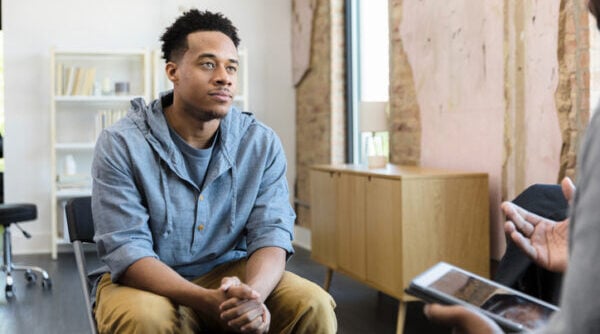




For anyone with mental health challenges in our country, societal expectations, culture, and public health can lead to debilitating feelings of self-doubt, myth, and stigma–especially in the Black community. The stigma and myths abound, too often robbing our community of the health and progress we deserve, and leading to fatal consequences.
One such myth is that mental illness is a sign of weakness, especially among Black men. This segment of our population has a long history of being demasculinized and marginalized based on the color of their skin and resilient stereotypes. Adding another layer of marginalization on top of the difficulties of accessing mental health treatment, and we find ourselves in a public health crisis that has not significantly improved for the Black and other marginalized communities in many generations.
Consider the way our communities accept and buy into the stigma and myth. Ask yourself, how many times have you used words like “looney”, “nut”, or described a person struggling with a mental health challenge as, “crazy as heck,” or worse? Now ask yourself if you would use equally derogatory words and phrases to describe someone’s race, physical abilities, or intellect.
As with all types of negative attitudes, ideas, and policies, the best way to combat and mitigate these age-old deterrents to health is with facts, education, and truth. To fight against these negative attitudes, we need to be aware of these facts:
- Mental health challenges are common, especially in the Black community: A recent study from Harvard Medical School and the University of Queensland found that as many as half the world’s population will experience a mental health disorder at some point in their lives. In the U.S., mental illness is as prevalent in the Black community as it is in any other demographic, though the levels of trauma and violence historically experienced by the Black community remain at a higher level than that experienced by the White population overall. Also, mental illness is compounded by the psychological stress of systemic racism. African American adults are 20 percent more likely to report serious psychological distress than white adults, and are more likely to experience chronic and persistent, mental illness rather than episodic mental health issues.
- Care is hard to access and quality care is particularly hard for Black Americans: Only one in three African Americans with mental health issues receive appropriate treatment. They’re also less likely to receive culturally informed care, less often considered in medical research, and often resort to emergency rooms instead of mental health specialists.
- Neglecting mental health challenges can have dire consequences: Suicide rates are increasing in the Black community. In 2020, suicide was the third leading cause of death among Blacks or African Americans aged 15 to 24. In 2019, Black female students were 60% more likely to attempt suicide than their non-Hispanic white counterparts.
To combat this crisis, we must:
- Normalize mental health discussions: Consider talking openly about your mental health, both the good and the bad, with your family and close friends. Making this topic a part of normal conversation, as well as considering talking to a therapist as routine as getting a check-up, can help decrease the stigma around addressing mental health challenges.
- Speak out in the community: Whether at work, at church, or in other group settings, you can speak out about your mental health highs and lows and the importance of seeking professional help, while encouraging others to do the same. You’ve heard the phrase about walking a mile in another’s shoes, and the same applies in this situation: you don’t know what others are going through. By speaking out about mental health challenges and normalizing seeing help, you may be saving a life.
- Recognize someone in crisis: You are not alone. There are resources available for those who are struggling with feelings of self-harm. If you or someone you know is experiencing these feelings, you can call the Suicide and Crisis Lifeline at 988, 24 hours a day, 7 days a week.
Let’s all contribute to tackling this public health crisis. By working together, we can be part of the solution.
—
iStock image

